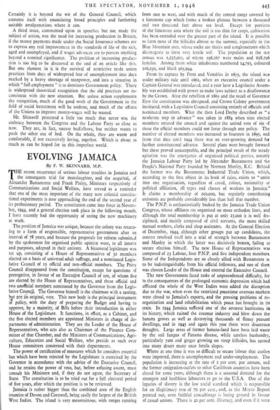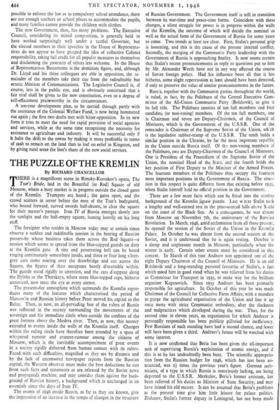EVOLVING JAMAICA
By F. W. SKINNARD, M.P.
THE recent recurrence of serious labour troubles in Jamaica and the consequent trial for manslaughter, and the acquittal, of Alexander Bustamente and Frank Pixley, Ministers respectively of Communications and Social Welfare, have served as a reminder that one of the most important of the many new colonial constitu- tional experiments is now approaching the end of the second year of its probationary period. The constitution came into force in Novem- ber, 1944, and a general election took place in the following month. I have recently had the opportunity of seeing the new machinery at work.
The position of Jamaica was unique, because the colony was return- ing to a form of responsible, representative government after an interval of 78 years, and because the proposals for reform submittal by the spokesmen for organised public opinion were, to all intents and purposes, adopted in their entirety. A bicameral legislature was set up, consisting of a House of Representatives of 32 members elected on a basis of universal adult suffrage, and a nominated Legis- lative Council of 15 official and non-official members. The Privy Council disappeared from the constitution, except for questions of prerogative, in favour of an Executive Council of ten, of whom five are elected by the House of Representatives, and three official and two unofficial members nominated by the Governor from the Legis- lative Council, The Governor himself is the chairman with a casting, but mt an original, vote. This new body is the principal instrument -4 policy, with the duty of preparing the Budget and having to approve, by a majority, of Bills before their introduction in either House of the Legislature. It functions, in effect, as a Cabinet, and the five elected members are appointed Ministers in charge of de- partments of administration. They are the Leader of the House of Representatives, who acts also as Chairman of the Finance Com- mittee of that Chamber, and the Ministers of Communications, Agri- culture, Education and Social Welfare, who preside as such over House committees concerned with their departments.
The power of certification of measures which he considers essential but which have been rejected by the Legislature is exercised by the Governor in accordance with the advice of the Executive Council, and he retains the power of veto, but, before refusing assent, must consult his Ministers and, if they do not agree, the Secretary of State. The constitution is to be tried out for a full electoral period of five years, after which the position is to be reviewed.
Jamaica is rather bigger than the combined area of the English counties of Devon and Cornwall, being easily the largest of the British West Indies. The island is very mountainous, with ranges running from east to west, and with much of the central range covered by a limestone cap which forms a broken plateau between a thousand and two thousand feet above sea level. Except for portions of the limestone area where the soil is too thin for crops, cultivation has been extended over the greater part of the island. It is possible to farm most of the hillsides almost to the summit, especially in the Blue Mountain area, whose rocks are shales and conglomerates which disintegrate to form very fertile soil. The population at the tast census was 1,237,063, of whom 598,267 were males and 638,796 females. Among them white inhabitants numbered 14,793, coloured 216,250, and black 965,944.
From its capture by Penn and Venables in x655, the island was under military rule until 1661, when an executive council under a Captain General was introduced, and a year later a Legislative Assem- bly was established with power to make laws subject to a disallowance by the Crown. After the rebellion of 1865 and the recall of Governor Eyre the constitution was abrogated, and Crown Colony government instituted, with a Legislative Council consisting entirely of officials and nominated members. What the then Lord Derby described as " a moderate step in advance " was taken in 1884 when nine elected members entered the council and against the united vote of six of these the official members could not force through any policy. The number of elected members was increased to fourteen in 1895, and from that date .until 1944 there was an ever-growing demand for further constitutional advance. Several plans were brought forward but these proved unacceptable, and the principal result of the steady agitation was the emergence of organised political parties, notably the Jamaica Labour Party led by Alexander Bustamente and the People's National Party founded by Norman Manley, K.C. Behind the former was the Bustamente Industrial Trade Union, which, according to the first object in its book of rules, exists to " unite into one organisation, regardless of creed, colour, nationality or political affiliation, all types and classes of workers in Jamaica." It claims a membership of 200,000, but regularly contributing unionists are probably considerably less than half that number.
The P.N.P. is enthusiastically backed by the Jamaica Trade Union Congress, whose affiliates Pre organised on more orthodox lines, and although the total membership is put at only 23,000 it is well dis- ciplined, and mainly composed of civil servants, the more skilled manual workers, clerks and shop assistants. At the General Election of Decembet, 1944, although other groups put up candidates, the contest resolved itself into a trial of strength between Bustamente and Manley in which the latter was decisively beaten, failing to
secure election himself. The new House of Representatives wa, composed of 23 Labour, four P.N.P. and five independent members.
Some of the Independents are so closely allied with Bustamente at to be indistinguishable from his official followers, and one of then[ was chosen Leader of the House and entered the Executive Council.
The new Government faced tasks of unprecedented difficulty, for to the consequences of the prolonged economic depression which had afflicted the whole of the West Indies were added the disruption due to the war, when even the restricted peacetime overseas markets were closed to Jamaica's exports, and the pressing problems of re- organisation and land rehabilitation which peace has brought in its train. In 1944 Jamaica suffered one of the severest hurricanes in its history, which ruined the coconut industry and blew down the banana groves as well as destroying thousands of flimsy peasant dwellings, and in 1945 and again this year there were disastrous droughts. Large areas of former banana-land have been laid waste by the soil fungus of Panama disease, while careless husbandry, particularly yam and ginger growing on steep hillsides, has turned into stony desert many once fertile slopes.
Where at one time it was so difficult to secure labour that coolies were imported, there is unemployment and under-employment. The population is increasing at the rate of 2 per cent. per annum, and the former emigration-outlets to other Caribbean countries have been closed for some years, although there is a seasonal demand for the strongest and healthiest labourers to go to the U.S.A. One of the legacies of slavery is the low social standard which is responsible for an illegitimacy rate of 7o per cent., and, as the Moyne Report pointed out, even faithful concubinage is losing ground in favour of casual unions. There is 4o per cent. illiteracy, and even if it were possible to enforce the law as to compulsory school attendance, there are not enough teachers or school places to accommodate the pupils, and many families cannot provide the children with clothes.
The new Government, then, has many problems. The Executive Council, considering its mixed composition, is generally held to have worked surprisingly well under a tactful Governor, but the elected members in their speeches in the House of Representa- tives do not appear to have grasped the idea of collective Cabinet responsibility, taking full credit for all popular measures to themselves and disclaiming the paternity of others less welcome. In the House of Representatives Bustamente is the dominant figure, and, although Dr. Lloyd and his three colleagues are able in opposition, the re- mainder of the members take their cue from the redoubtable but erratic Minister of Communications. The Legislative Council is, of course, less in the public eye, and is obviously concerned that a fair trial shall be given to the new constitution, even to a degree of self-effacement praiseworthy in the circumstances.
A ten-year development plan, to be carried through partly with the assistance of the Colonial Welfare Fund, is now being hammered out again ; the first two drafts met with bitter opposition. In its new form it tries to meet the need for rapid provision of social agencies and services, while at the same time recognising the necessity for assistance to agriculture and industry. It will be successful only if it halts the drift to the towns by making it more profitable in terms of cash to remain on the land than to loaf on relief in Kingston, and by giving rural areas the lion's share of the new social services.



































 Previous page
Previous page